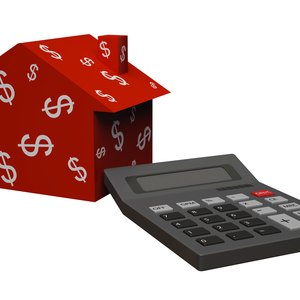
Escrow accounts are designed to pay costs associated with your home, notably property taxes and insurance premiums. Your lender factors in a specific amount to place in escrow, includes that amount in your mortgage payment and debits money from the account when those bills come due. When the lender allocates too little money to this account, it creates an escrow shortage. The lender can request that you to repay the deficit in a lump sum, or in monthly installments added to the loan, or they may leave the choice up to you. The choice that's best for you depends on your ability to pay the balance at once, and what the escrow shortage will do to your future mortgage payments if you don't.
Tips
Although you are able to pay an escrow shortage in full, this may not be the best option for your specific financial situation.
Understanding Shortage Causes
The Real Estate Settlement Procedures Act, or RESPA, regulates escrow accounts. In addition to the projected annual cost of taxes and insurance, RESPA allows lenders to keep a minimum balance in your escrow account to cover unexpected expenses. The federal maximum for this cushion is one-sixth of the total annual payments.
In an escrow shortage, you have a positive balance in your escrow account, but it's less than the amount targeted by the lender as being sufficient, likely meaning that the lender is using some of that cushion to make your tax and insurance payments. Escrow shortages are generally caused by an unexpected rise in your tax bill or insurance premiums. You may have increased your hazard insurance coverage, for example, or a series of claims may have caused your insurance carrier to increase your premiums. Real estate taxes can also balloon if your local authorities increase the tax rate, or if your house is appraised at a higher value.
It's the loan servicer's responsibility to pay the bills that escrow is set aside to cover. If it's late in doing so and your account was assigned a penalty or late fee as a result, the servicer should pay that amount, as long as you were current in your mortgage payments at the time, according to the U.S. Department of Housing and Urban Development.
RESPA and Your Options
RESPA also requires the loan servicer to conduct an annual escrow analysis on each account, and governs what lenders can do in case of a shortage or a deficiency. If there's a shortage of less than one month's payment, the lender has three options. It can allow the shortage to exist and not require the borrower to make up the shortfall; require the borrower to repay the shortage within 30 days or require the borrower to repay the shortage in equal monthly installments over a 12-month period.
If the shortage is greater than one month's payment, the lender can either allow it to remain or require you to make it up in equal monthly installments over 12 months. It cannot require a lump-sum payment within 30 days under that scenario, although the lender may elect to offer you that option.
If you've gone through the allowed cushion in your escrow account and have a negative balance, that's an escrow deficiency. The servicer can require you to make-up the deficiency in two or more monthly payments, rather than spreading it out over a full year. If the deficiency is less than one month's payment, it also can require payment within 30 days.
Picking Your Payment Plan
Your loan servicer will give you the option of paying an escrow shortage in full, or accepting the monthly installments instead. From an economic standpoint, paying in full won't save you any money. Because interest isn't charged on the shortage amount, you may find it advantageous to drag the payments out as long as possible.
However, the escrow shortage means that your lender didn't set aside enough money for taxes and insurance, meaning it likely will increase the escrow payments for the next year. Since that's folded into your mortgage payments, your mortgage premiums will rise as well. Folding the previous year's shortage into the current mortgage payment may increase your monthly payment to the point that you'd prefer taking care of the existing shortage with one check. Pick the plan that's best for your financial situation.
References
- SunTrust: Mortgage Frequently Asked Questions
- Consumer Finance: § 1024.17 Escrow accounts
- Cornell Law School. "Escrow." Accessed March 15, 2020.
- Los Angeles County Consumer and Business Affairs. "Escrow." Accessed March 15, 2020.
- Consumer Financial Protection Bureau. "What Is an Escrow or Impound Account?" Accessed March 15, 2020.
- The People's Law Library of Maryland. "Rent Escrow: When the Landlord Fails to Make Repairs." Accessed March 15, 2020.
- California Department of Business Oversight. "Online Escrow Fraud Questions and Answers." Accessed March 15, 2020.
- Consumer Financial Protection Bureau. "Mortgages Key Terms." Accessed March 15, 2020.
- FindLaw. "Connecticut Security Deposit Laws." Accessed March 15, 2020.

